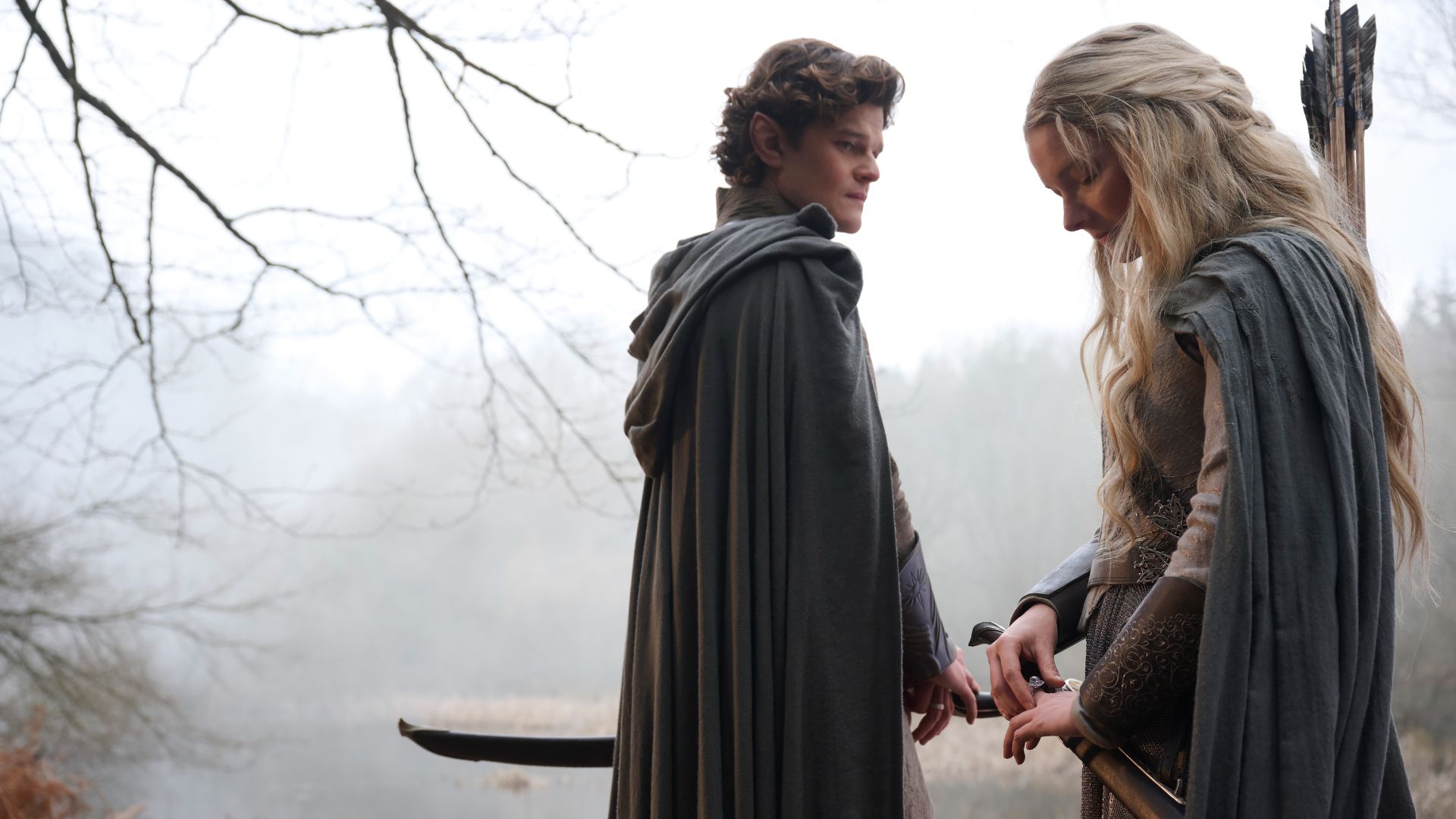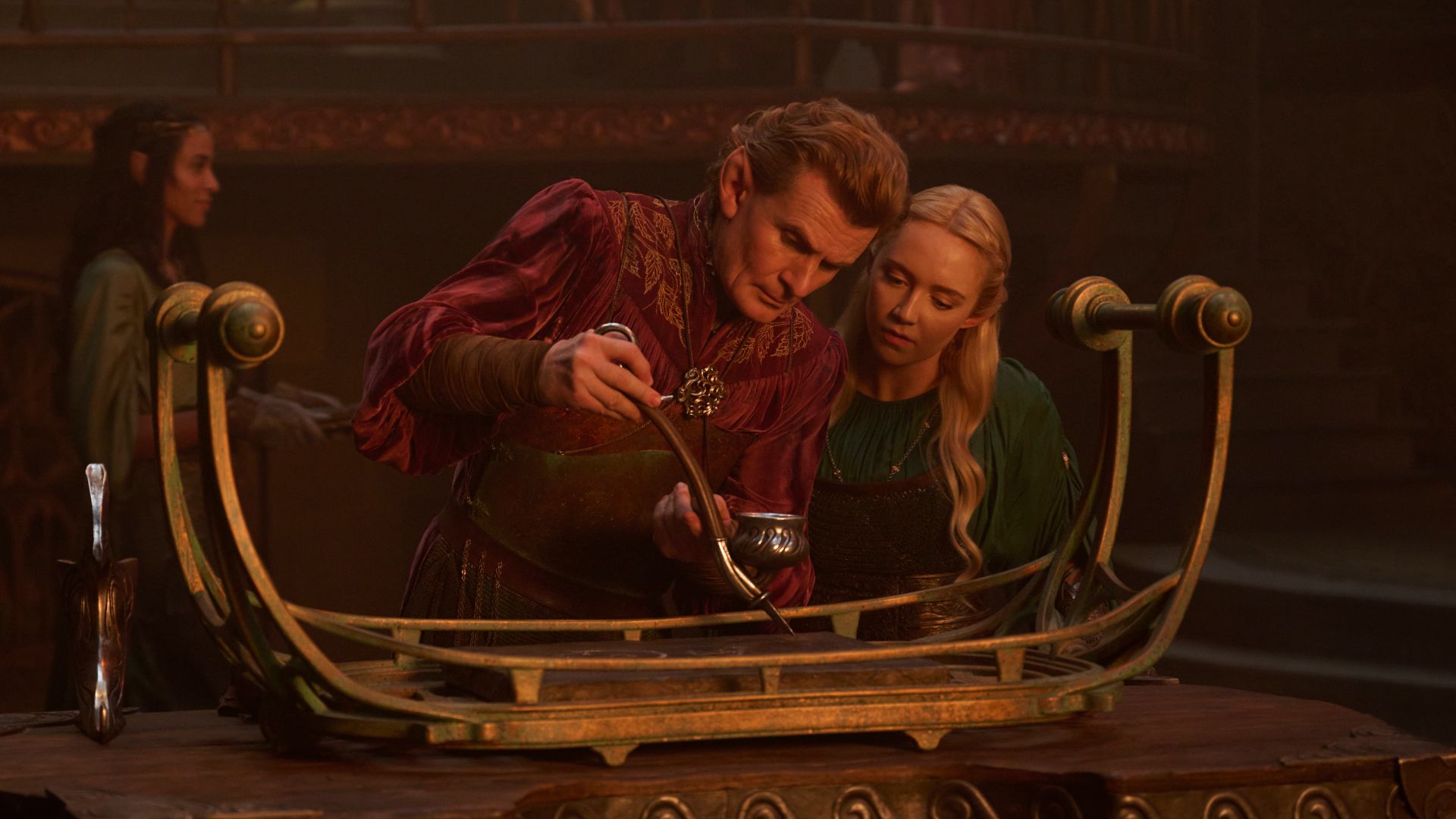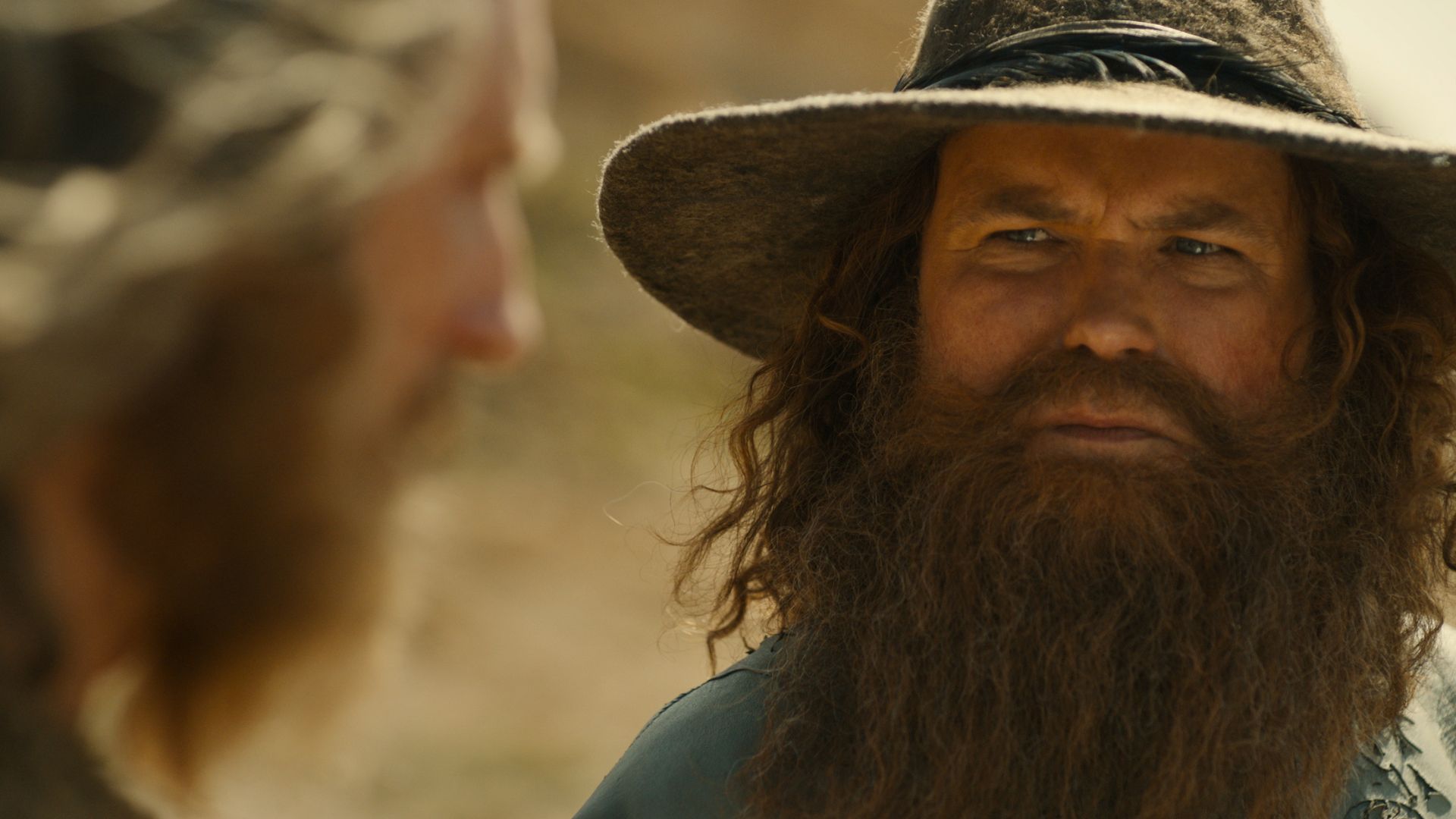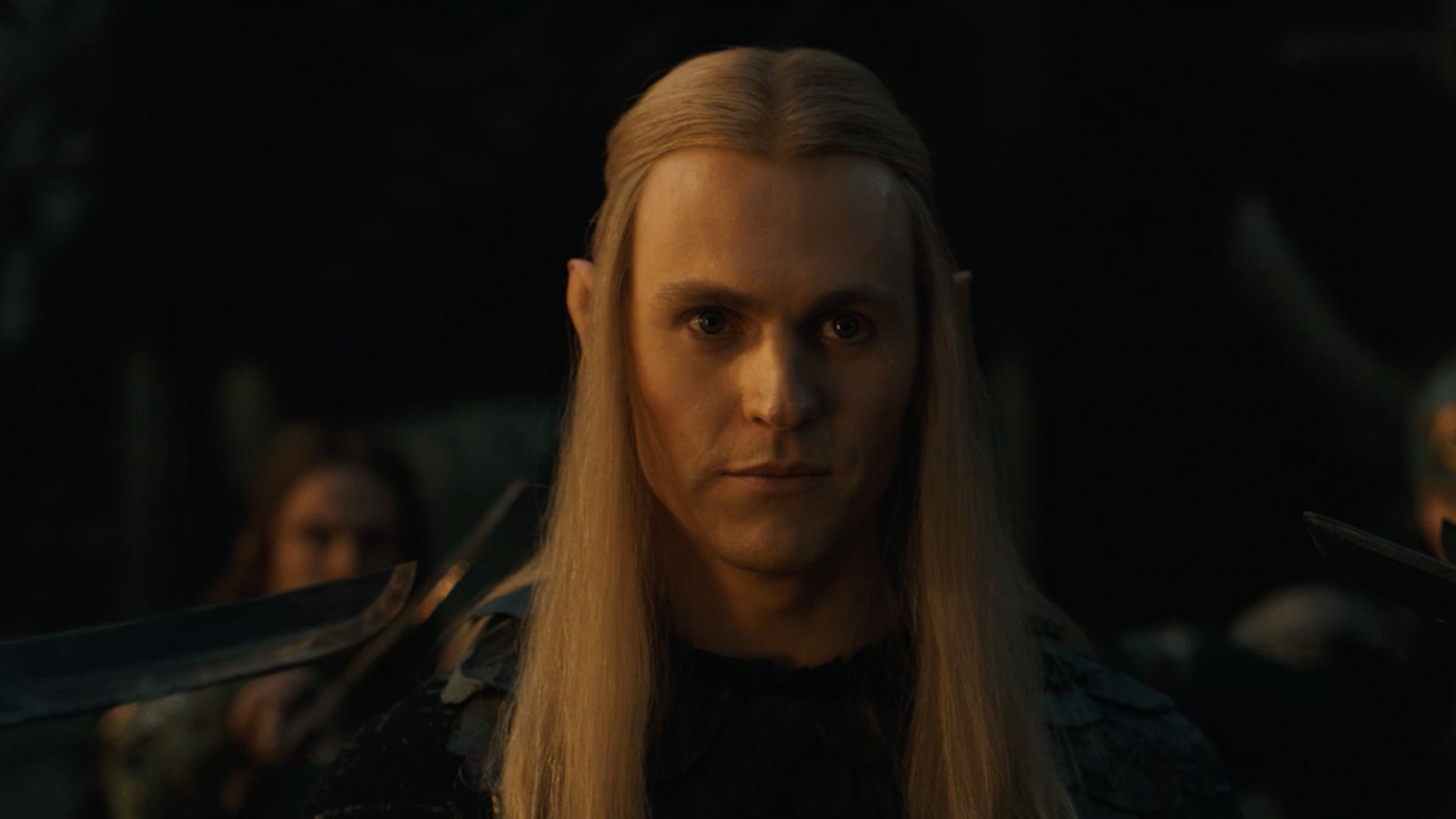
The Rings of Power season 2 begins with a grim, somber 20-minute prologue outlining Sauron's previous assassination at the hands of Adar and his subsequent re-emergence. It's a powerful mission statement for what's to come: this is Sauron's world, and we're just living in it.
Much of the core of the sophomore season's narrative, then, revolves around Charlie Vickers' Lord of the Rings – but not quite as you might expect. Instead, Sauron-Halbrand enters the walls of the elven realm of Eregion after his unmasking and re-invents himself as the pale, wily Annatar, the 'Lord of Gifts', in a ruse to trick Celebrimbor (Charles Edwards) into aiding in his plan to "perfect" Middle-earth and bring it to heel.
While some may be disappointed by the lack of Galadriel in the thrust of the season's narrative in Eregion, it smartly allows the dynamic between Annatar and Celebrimbor to bear fruit. Throughout, the latter's turn from steely-eyed smith to quivering wreck acts as a significant step towards making Sauron one of television's great villains.
Of course, that wouldn't be possible without Edwards' performance. In a season crowded with stellar work – Morfydd Clark's nuanced Galadriel and the eminently affable pairing of Prince Durin (Owain Arthur) and Disa (Sophia Nomvete) to name but a few – the Celebrimbor actor still manages to stand out from the pack with his vice-like grip on the spectrum of emotions that the smith exhibits – from triumph to tragedy.
Forged in fire

Galadriel may be removed from Sauron's orbit for the majority of the season, but she has considerable impact elsewhere. As the elves struggle on how best to deal with Sauron, Clark's elven commander eventually finds herself bumping into one of the second season's biggest improvements: Adar.
Adar is a perfect example of how the second season tops the first. Instead of going bigger and better, showrunners J.D. Payne and Patrick McKay wisely sidestep most of the spectacle, instead choosing to dig more into the emotional depth of its characters – often by cornering them into seemingly unwinnable situations.
While Joseph Mawles' Adar in the first season was adept enough, the recast Sam Hazeldine steps into the role as the orc leader with aplomb, commanding attention and delivering each line with the sort of weight and gravitas that turns what could have been a one-note antagonist into something far more rich and rewarding.
The fact it all culminates in an epic multi-episode battle is an extra bonus. It's not the Battle of Helm's Deep – partly due to chunks of the set-piece feeling decidedly too clean for an all-out war – but it harkens back to the days of Game of Thrones' golden years with how it effortlessly stitches together the adrenaline of its action with well-earned and emotional character beats.
If Galadriel and Adar's story were balanced alongside Celebrimbor and Annatar, The Rings of Power season 2 would be a near-guarantee to be crowned the best show of 2024. Unfortunately, there's just too much else to juggle – even though almost all of it is good-to-great.
Deep breath now: the new season contains Galadriel and the elves' struggle, complete with the fresh counsel of the "wisest" elf Cirdan (Ben Daniels); Celebrimbor and Annatar at Eregion; Durin and the dwarves' changing power dynamics in Khazad-dum; Adar and the orcs' march across Middle-earth; Pharazon's rise in Numenor; Arondir and Theo's adventures; The Stranger and Nori's trek across the new desert region of Rhun and, finally, the fledgling partnership between stranded Isildur and newcomer Estrid (Nia Towle).
It's just too much for eight episodes. A 10-episode run could have afforded some of the more undercooked plots time and space to breathe. Frustratingly, it's an issue that shows still haven't been able to crack in the age of streaming.
A merry fellow

At multiple points during the season, characters are asked – in the parlance of Middle-earth – to "speak plain". To put it plainly here, The Rings of Power occasionally spends too much time with middling storylines and not enough time with its more robust plots.
Those familiar with Tolkien's works, for example, will be acutely aware of the future importance of Numenor. Despite that, viewers may not be so enamored with its glacially paced political intrigue that's so far removed – both spatially and tonally – from the meat of the second season's overarching story.
Its one gripping loose thread left over from the first season – that of Miriel shorn of her sight and with an ever-shaky grip on her rule – also fails to ignite, with the character feeling equal parts underexplored and underutilized. There's certainly a case to be made for Numenor to have skipped the season entirely and returned in Year Three.
But that's not the case of all tales away from Eregion. With his bright yellow boots and love for ditties, the god-like Tom Bombadil is a paradoxical presence in Middle-earth, one frequently at odds with the stories and darker tone around him. I assumed his role in any Lord of the Rings adaptation would be almost impossible to get right. I couldn't have been more wrong.
Mercifully, The Rings of Power's 'Old Tom' is a surprise triumph as Rory Kinnear's homely, quaint hermit not only provides plenty of curiosity himself, but also supercharges The Stranger's storyline with a faintly twee blend of mystery, magic, and a sprinkling of exposition as he guides The Stranger towards his truth.
The Stranger's story, complete with the looming shadow of Ciaran Hinds' mysterious Dark Wizard, is ultimately one of the big successes of the season because – unlike the majority of the narratives within – it's a complete, satisfying arc that doesn't rely on foreknowledge of Tolkien or belief that the showrunners will stick the landing. And, yes, we discover The Stranger's name. That helps too.

Does The Rings of Power season 2 fire on all cylinders? Not quite. Much like Tolkien's work, the Prime Video series is knotty, dense, and sometimes contradictory. Yet, somehow, it emerges from the other side with the feeling of a job supremely well done, and accomplishes the unenviable task of fully capturing the grand tapestry of Middle-earth and its peoples. That's all in spite of a Sauron-esque wandering eye approach to its narrative structure almost undoing its masterful work.
Each character feels as substantial and emotionally complex as any other on television, while the second season delivers on the promise of its first year with riotous action, a deliciously evil villain, and one of the best ensemble casts assembled in recent times. Despite feeling fit to burst, it's a genuine pleasure to return to Middle-earth again.
The first three episodes of The Rings of Power season 2 are streaming on Prime Video from August 29, with new episodes to follow weekly. For more, check out The Rings of Power season 2 release schedule.







